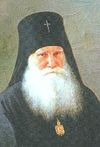

| Previous day | Next day |
| Old Style
October 12
|
Thursday |
New Style
October 25
|
| 22nd Week after Pentecost. Tone 4. | No fast.
|
![]() Martyrs Probus, Tarachus, and Andronicus, at Tarsus in Cilicia (304).
Martyrs Probus, Tarachus, and Andronicus, at Tarsus in Cilicia (304). ![]() St. Cosmas the Hymnographer, bishop of Maiuma (ca. 787).
St. Cosmas the Hymnographer, bishop of Maiuma (ca. 787).
Martyr Domnina of Anazarbus (286). St. Martin the Merciful, bishop of Tours (397). Sts. Amphilochius (1452), Macarius (1480), and Tarasius (1440), abbots, and Theodosius, monk (15th c.), of Glushitsa Monastery (Vologda), disciples of St. Dionysius of Glushitsa. St. Arsenius, archimandrite, of Svyatogorsk Monastery (1859). St. Euphrosyne (Mezenova) the Faster, schema-abbess, of Siberia (1918). Glorification of St. Philaret, archbishop of Chernigov (2009).
New Hieromartyrs Juvenal (Maslovsky), archbishop of Ryazan (1937) and Lawrence (Levchenko), hieromonk, of Optina Monastery (1937). New Hiero-confessor Nicholas (Mogilevsky), metropolitan of Alma-Ata (1955).
“Jerusalem” (48) and “Kaluga” (1748) Icons of the Most Holy Theotokos.
Hieromartyr Maximilian, bishop of Noricum (284). St. Mobhi of Glasnevin (Ireland) (544). Martyr Edwin, king of Northumbria (633). St. Wilfrid, bishop of York (709). Translation of the relics of St. Sabbas the Sanctified from Rome to Jerusalem (1965). Virgin-martyr Anastasia of Rome (ca. 250). St. Theodotus, bishop of Ephesus. St. Jason, bishop of Damascus. St. Symeon the New Theologian [transferred from Great Lent, March 12] (1022). St. Theosebius the God-bearer, of Arsinoe on Cyprus.
Thoughts for Each Day of the Year
According to the Daily Church Readings from the Word of God
By St. Theophan the Recluse

Thursday. [Col. 1:24-29; Luke 9:7-11]
Hearing about the works of Christ the Saviour, Herod said, “John I beheaded; but who is This?”—and he desired to see Him. He desired to see Him and sought an opportunity for this, but was not made worthy, because he sought not unto faith and salvation, but out of empty curiosity. Inquisitiveness is the tickling of the mind; truth is not the road to it, but news, especially sensational news. That is why it is not satisfied with the truth itself, seeks something extraordinary in it. When it has contrived something extraordinary, it stops there and attracts other people to it. In our days, it is the German mind that does this. The Germans are obsessed with contriving things. They covered the whole realm of the truth of God with their contrivances as with a fog. Take dogma, ethics, history, the word of God—all are so overloaded with contrivances that you cannot get to the truth of God. Meanwhile, these things interest them and those who have the same mindset. The truth of God is simple; need a proud mind be occupied with it? It would be better off contriving its own things. This is sensational, although empty and weak like a spider’s web. To see that it is so, look at the current theories of the creation of the world: they are like a somnambulistic or drunken delirium. And yet how good they seem to those who thought of them! How much energy and time are wasted on this—and all in vain! The deed was accomplished simply: He spake and it came to be. He commanded and it was created. Nobody can think up anything better than this solution.






